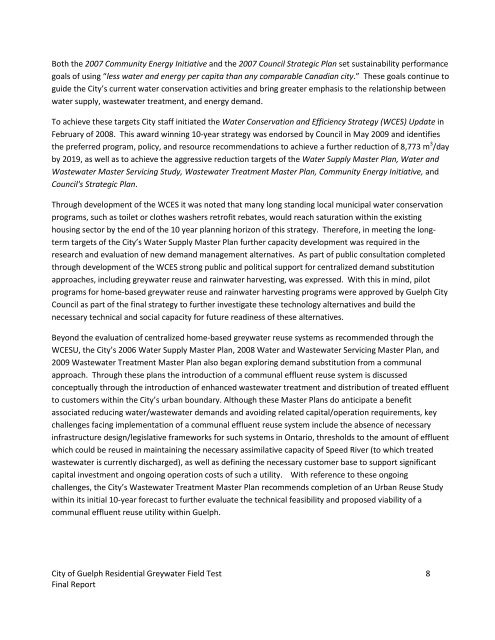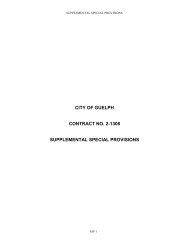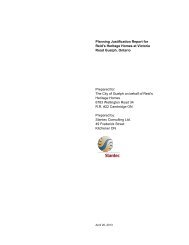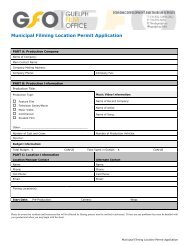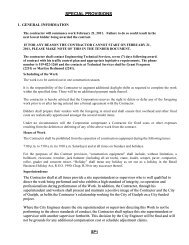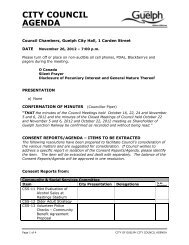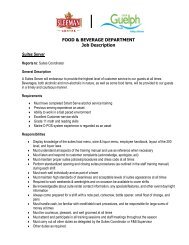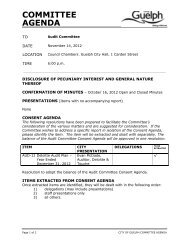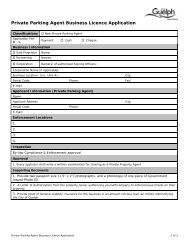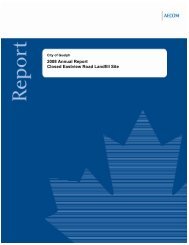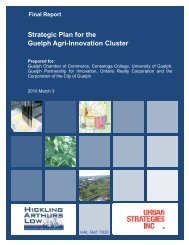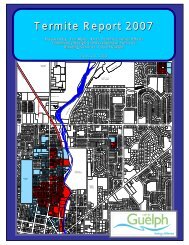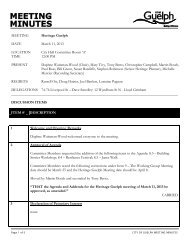guelph residential greywater field test final report - City of Guelph
guelph residential greywater field test final report - City of Guelph
guelph residential greywater field test final report - City of Guelph
Create successful ePaper yourself
Turn your PDF publications into a flip-book with our unique Google optimized e-Paper software.
Both the 2007 Community Energy Initiative and the 2007 Council Strategic Plan set sustainability performance<br />
goals <strong>of</strong> using “less water and energy per capita than any comparable Canadian city.” These goals continue to<br />
guide the <strong>City</strong>’s current water conservation activities and bring greater emphasis to the relationship between<br />
water supply, wastewater treatment, and energy demand.<br />
To achieve these targets <strong>City</strong> staff initiated the Water Conservation and Efficiency Strategy (WCES) Update in<br />
February <strong>of</strong> 2008. This award winning 10-year strategy was endorsed by Council in May 2009 and identifies<br />
the preferred program, policy, and resource recommendations to achieve a further reduction <strong>of</strong> 8,773 m 3 /day<br />
by 2019, as well as to achieve the aggressive reduction targets <strong>of</strong> the Water Supply Master Plan, Water and<br />
Wastewater Master Servicing Study, Wastewater Treatment Master Plan, Community Energy Initiative, and<br />
Council's Strategic Plan.<br />
Through development <strong>of</strong> the WCES it was noted that many long standing local municipal water conservation<br />
programs, such as toilet or clothes washers retr<strong>of</strong>it rebates, would reach saturation within the existing<br />
housing sector by the end <strong>of</strong> the 10 year planning horizon <strong>of</strong> this strategy. Therefore, in meeting the longterm<br />
targets <strong>of</strong> the <strong>City</strong>’s Water Supply Master Plan further capacity development was required in the<br />
research and evaluation <strong>of</strong> new demand management alternatives. As part <strong>of</strong> public consultation completed<br />
through development <strong>of</strong> the WCES strong public and political support for centralized demand substitution<br />
approaches, including <strong>greywater</strong> reuse and rainwater harvesting, was expressed. With this in mind, pilot<br />
programs for home-based <strong>greywater</strong> reuse and rainwater harvesting programs were approved by <strong>Guelph</strong> <strong>City</strong><br />
Council as part <strong>of</strong> the <strong>final</strong> strategy to further investigate these technology alternatives and build the<br />
necessary technical and social capacity for future readiness <strong>of</strong> these alternatives.<br />
Beyond the evaluation <strong>of</strong> centralized home-based <strong>greywater</strong> reuse systems as recommended through the<br />
WCESU, the <strong>City</strong>’s 2006 Water Supply Master Plan, 2008 Water and Wastewater Servicing Master Plan, and<br />
2009 Wastewater Treatment Master Plan also began exploring demand substitution from a communal<br />
approach. Through these plans the introduction <strong>of</strong> a communal effluent reuse system is discussed<br />
conceptually through the introduction <strong>of</strong> enhanced wastewater treatment and distribution <strong>of</strong> treated effluent<br />
to customers within the <strong>City</strong>’s urban boundary. Although these Master Plans do anticipate a benefit<br />
associated reducing water/wastewater demands and avoiding related capital/operation requirements, key<br />
challenges facing implementation <strong>of</strong> a communal effluent reuse system include the absence <strong>of</strong> necessary<br />
infrastructure design/legislative frameworks for such systems in Ontario, thresholds to the amount <strong>of</strong> effluent<br />
which could be reused in maintaining the necessary assimilative capacity <strong>of</strong> Speed River (to which treated<br />
wastewater is currently discharged), as well as defining the necessary customer base to support significant<br />
capital investment and ongoing operation costs <strong>of</strong> such a utility. With reference to these ongoing<br />
challenges, the <strong>City</strong>’s Wastewater Treatment Master Plan recommends completion <strong>of</strong> an Urban Reuse Study<br />
within its initial 10-year forecast to further evaluate the technical feasibility and proposed viability <strong>of</strong> a<br />
communal effluent reuse utility within <strong>Guelph</strong>.<br />
<strong>City</strong> <strong>of</strong> <strong>Guelph</strong> Residential Greywater Field Test 8<br />
Final Report


